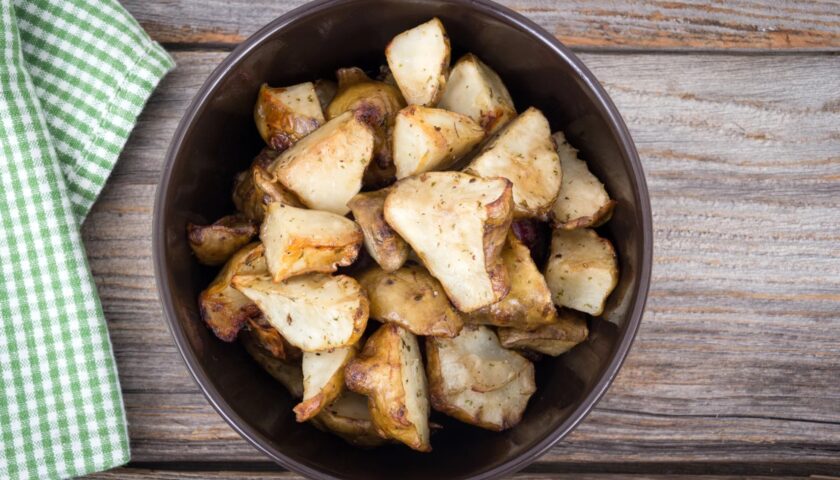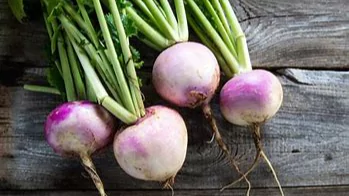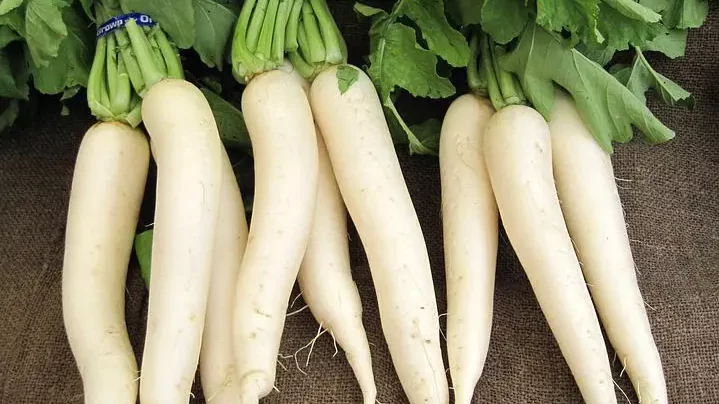Introduction of Sunchoke
Sunchoke is a delicious winter vegetable that should be in your kitchen. Also known as Jerusalem artichokes, Jerusalem artichokes are the tuber of perennial sunflowers, native to North America. They have brown skin and creamy white flesh.
Jerusalem artichokes are native to eastern North America. They are also known as Jerusalem artichoke or sun root. They don’t affect artichokes, but they do affect sunflowers.
The story of “Jerusalem” is associated with the Italian word girasola, which means sunflower. Jerusalem artichokes are perennial plants that grow six to ten feet tall. Although they have beautiful purple flowers, they are grown for their edible roots. Their roots are high in inulin (more on that below) and can be used or cooked.
Historically, Jerusalem artichokes have been a valuable food source in Native American culture, especially in the winter when storage is limited and water crops are not available. (See the Complete Moon Program for more information on the annual diet.)
History
The Jerusalem artichoke is an ancient American native to eastern North America, from Maine west to the Dakotas and south to northern Florida and Texas. Jerusalem artichoke is native to North America and can be found in the Ohio and Mississippi valleys. The first written record of the plant was published in 1605 by Champlain, a European explorer, who saw Americans growing Jerusalem artichokes and corn and beans in fields on Cape Cod.
This species was introduced to Europe in 1612 where it gained popularity as a food and delicacy. Its current range in North America is from the east coast to the Midwest and from southern Canada to Georgia. This land plant lives along the road, along the river, in fenced gardens and agronomic fields, preferring rich soil and water.
It is now grown in many places around the world including North America, Germany, France, Italy, countries in Eastern Europe, China and also (although to a lesser extent) in some countries that -warm and mountainous (India, Indonesia, Malaysia). , Kenya, Zaire and Nigeria).
What is the Nutrition Value of Sunchoke?

Sunchoke is a good source of iron, magnesium, potassium and calcium. high in fiber and low in carbohydrates; and contains inulin. Although inulin has some health benefits, it can cause gas or bloating when consumed in excess. Eating less should not be a problem, but eating in moderation is recommended.
Where to grow Sunchoke
Plant Jerusalem artichokes in full sun.
Sunchoke prefers well-drained soil, but will grow almost anywhere. Add compost or aged sand to the bed before planting; loose soil will make it easier to produce tubers.
Jerusalem artichoke prefers a soil pH of 5.8 to 6.2.
It is best to plant Jerusalem artichokes in a dedicated bed; once established, they spread quickly and may require effort to eradicate. The spread of tubers can be controlled by root prevention.
Jerusalem artichoke growing; it can be effectively beaten into a screen or air vent. Jerusalem artichokes will survive severe winters if a layer or mulch protects them.
Sunchoke planting time
Sunchoke tubers can be planted in the garden as early as 2-3 weeks before the average date of the last frost in spring. Jerusalem artichokes are best planted in soil that warms to 50°F (10°C).
Jerusalem artichoke grows best in temperatures ranging from 18 to 32°C (65 to 90°F). In hot climates, Jerusalem artichokes can be planted in winter.
Jerusalem artichoke needs 110 to 150 days to reach harvest.
Health benefits of Sunchoke
Jerusalem artichokes, or Jerusalem artichokes, are very different from Jerusalem artichokes. They look like ginger and are crunchy when eaten fresh. They can be mashed like potatoes after cooking and are a great substitute for jicama or water chestnuts in recipes.
Although they are not healthy when fried in vegetable oil, they make delicious fries. When cooked with other tubers, such as potatoes, they complement meat and stew. Besides being delicious, they help maintain intestinal health and provide additional health benefits.
Regulate blood sugar
Since Jerusalem artichokes have a lot of fiber, it takes a long time to digest them. This means that they slowly enter our blood and help prevent blood sugar spikes. This makes it the best choice for people with diabetes and pancreatic disease, or anyone who wants to regulate their blood sugar.
Jerusalem artichokes also have a glycemic value of 11. Eating a low glycemic diet can fight fatigue, heart disease and stabilize mood.
Helps in blood formation
The body needs a constant source of iron; This is especially true for women during menstruation. Anemia can be a problem for people who do not eat enough food that contains iron, which helps make new blood cells.
One cup of Jerusalem artichokes contains 28% of the daily requirement of iron and 20% of the daily requirement of copper, which helps to absorb iron.
Suitable for the intestines
Jerusalem artichokes are rich in inulin, a dietary fiber found in many fruits and vegetables. Inulin creates a prebiotic effect, providing a good environment for beneficial bacteria to feed and grow. Due to their high inulin content, inxibus can be difficult for some people to digest.
If you have never eaten Jerusalem artichokes before, it is best to start with a small amount because they can cause gas and bloating. Cooking helps to break down inulin, so cooking can help reduce this problem (but be careful not to cook, because it can burn).
Controls cholesterol and blood pressure
The high content of fiber makes Jerusalem artichokes excellent for reducing bad cholesterol levels by absorbing unnecessary fat. Nutrients also help insulin maintain proper blood pressure levels.
The high potassium and low sodium content of Jerusalem artichokes is beneficial for regulating high blood pressure and maintaining overall heart health.


